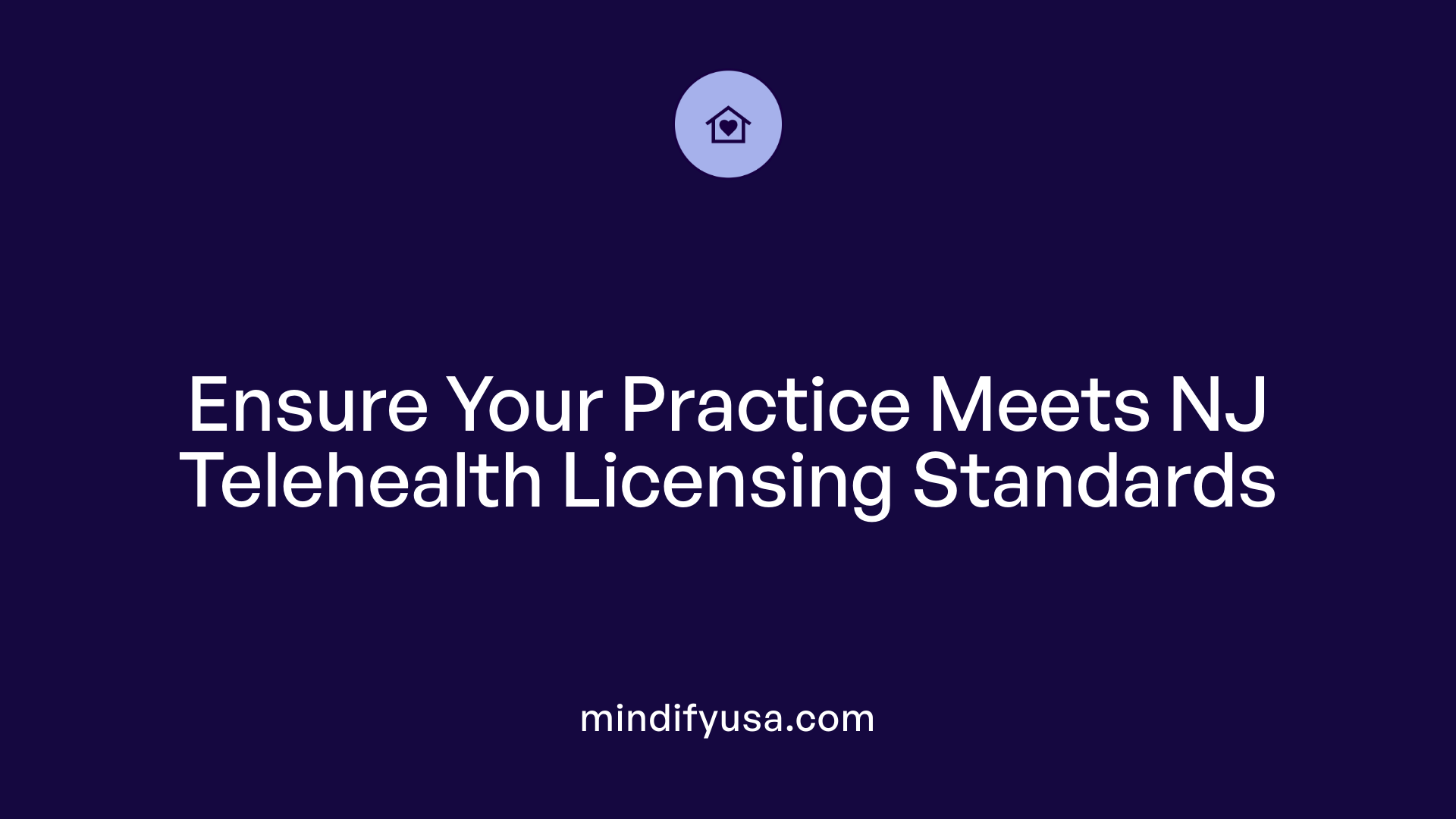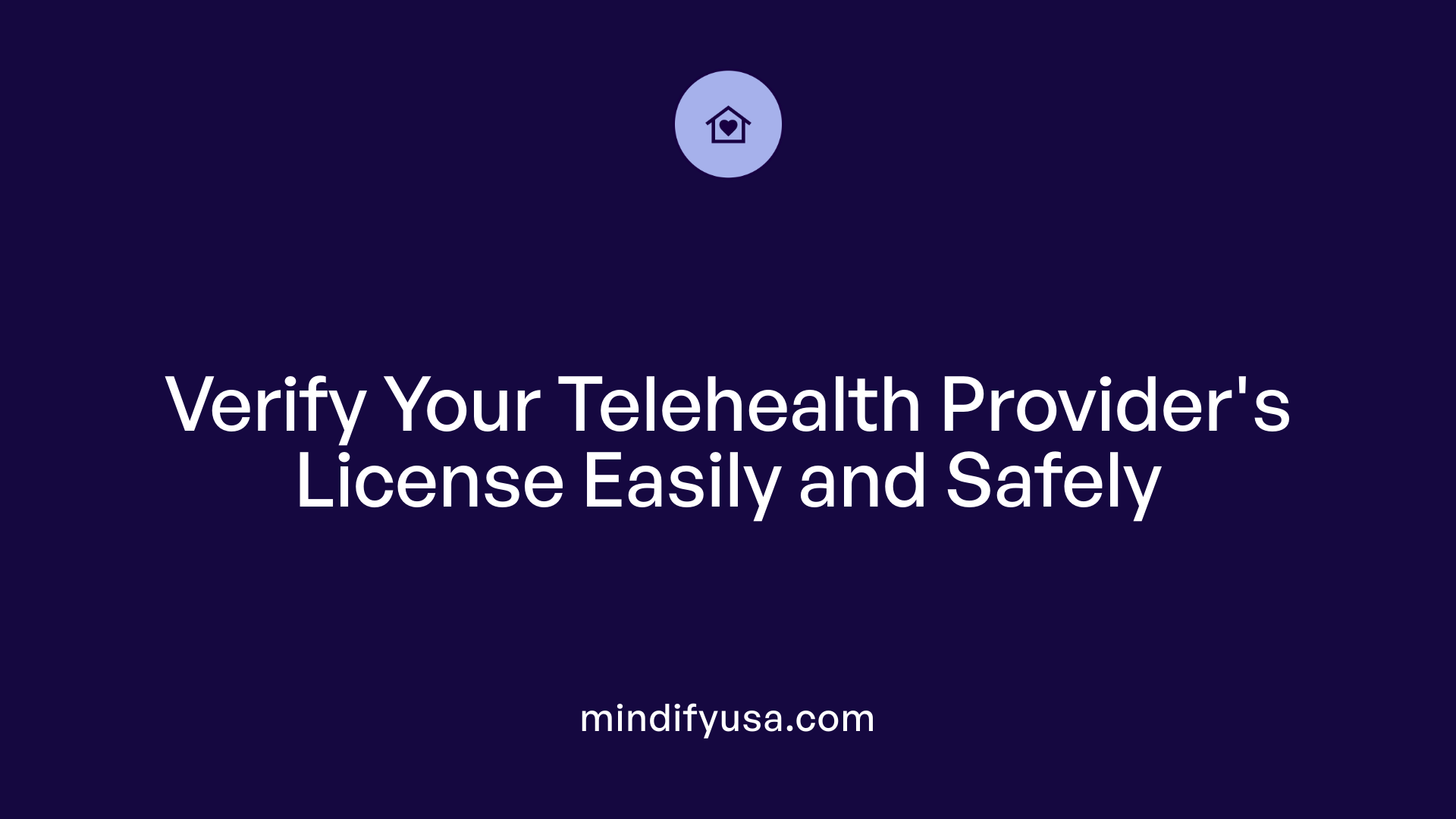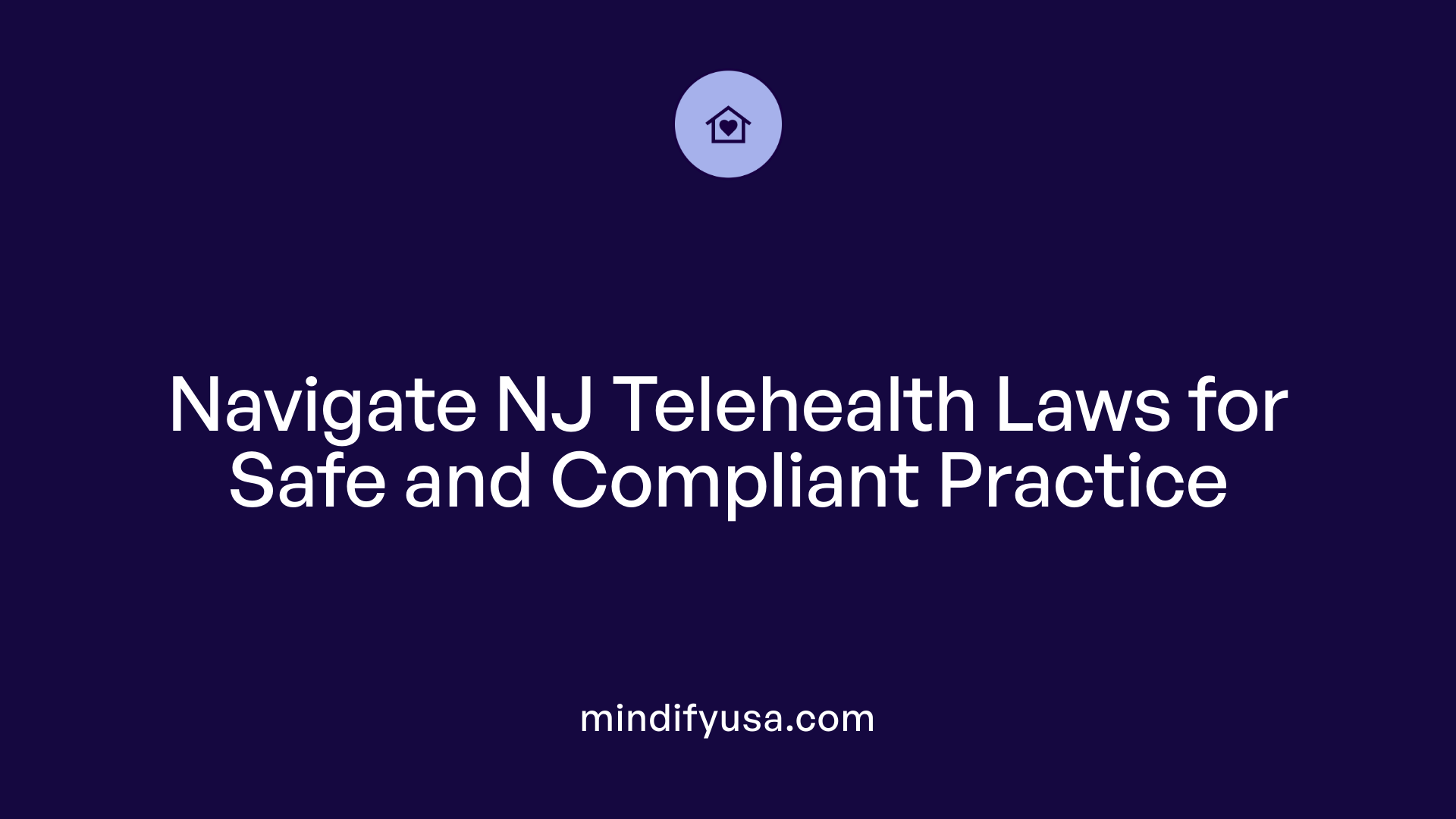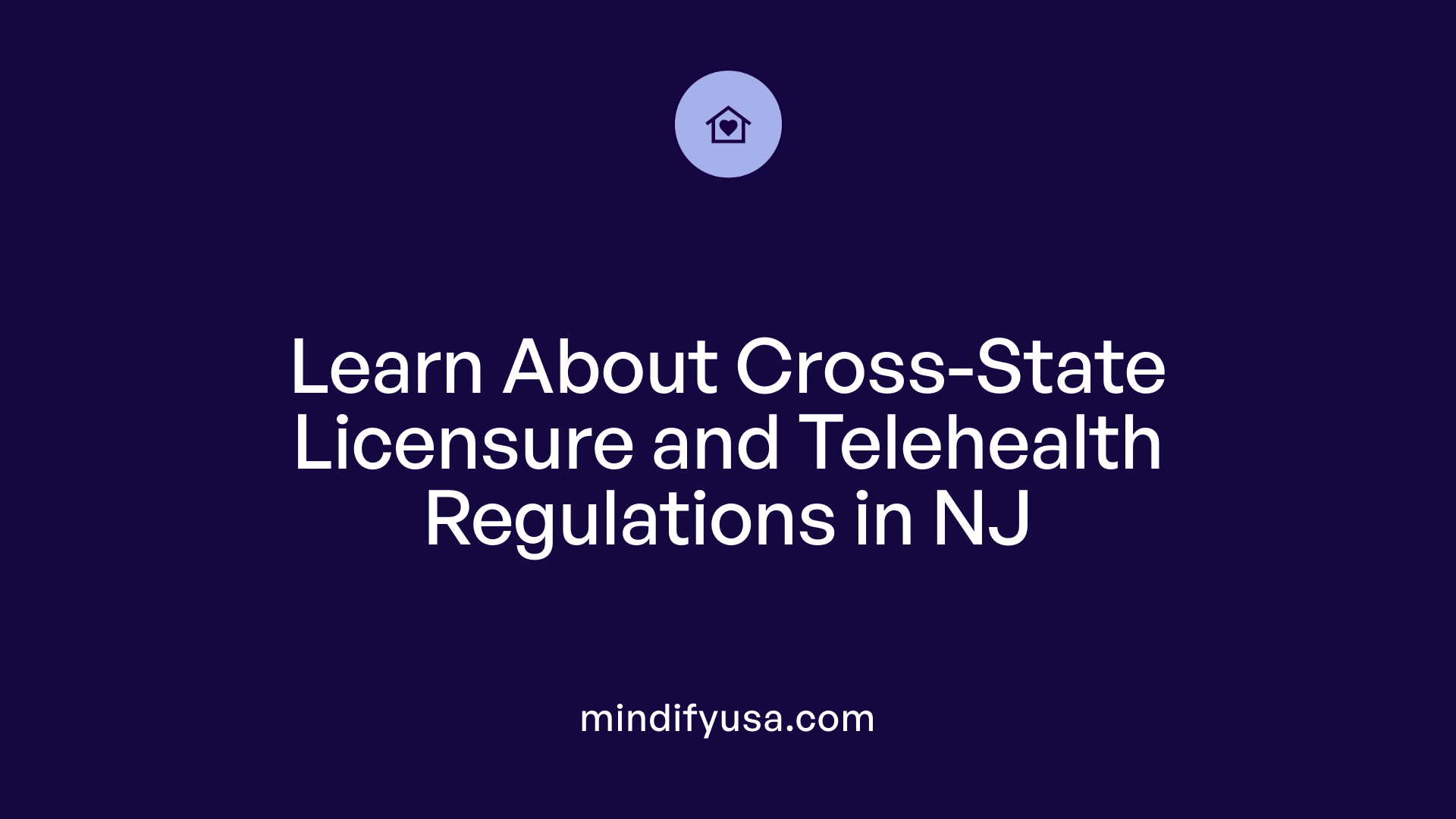Understanding Telehealth Licensing Regulations in NJ
The rapid expansion of telehealth services has revolutionized healthcare delivery, offering convenient access to mental health, medical, and specialty care. However, navigating the legal and regulatory landscape for telehealth providers, especially mental health professionals in New Jersey, requires careful understanding of licensing requirements, interstate practice laws, and compliance standards. This comprehensive overview explains whether telehealth therapists in NJ need to be licensed locally, how to verify licensure, and what regulations govern their practice to ensure safe, legal, and effective care.
Licensing Requirements for Telehealth Therapists in NJ

Are telehealth therapists required to be licensed in the state where the patient is located?
Yes, mental health professionals providing telehealth services in New Jersey must be licensed in the state where the patient is physically located. State laws and regulations explicitly mandate that practitioners hold a valid license issued by New Jersey’s licensing boards to deliver mental health care remotely. This requirement helps ensure that providers meet the state’s standards for education, competency, and ethical practice.
Practitioners are responsible for verifying the patient's location at the start of each telehealth encounter. They must also ensure that they are compliant with all licensing and practice standards before delivering services. Out-of-state providers can sometimes treat New Jersey residents if they have appropriate licensure, such as through licensure compacts or temporary licenses during public health emergencies.
Additionally, many states participate in multi-state licensure compacts, which streamline the licensing process for providers working across state lines. However, providers must still adhere to the specific regulations of each state and maintain proper licensure to avoid legal violations.
What standards must telehealth providers in NJ meet?
Telehealth providers in New Jersey are required to follow established standards of care similar to traditional in-person services. These standards include establishing a proper practitioner-patient relationship, obtaining informed consent, and adhering to confidentiality and privacy regulations, such as HIPAA.
Providers must use secure, synchronous two-way communication tools, such as video conferencing, to simulate face-to-face interactions. Audio-only services are generally not sufficient unless permitted by specific regulations for certain circumstances.
Practitioners must also ensure that they effectively assess, diagnose, and treat patients within their scope of practice, utilizing appropriate clinical judgment.
What is the scope of practice and standards of care?
The scope of practice for telehealth in New Jersey aligns with the general standards of in-person care, requiring practitioners to exercise the same level of skill, judgment, and ethical conduct. Telehealth services in mental health fields, such as psychology and counseling, are governed by state statutes that specify licensure requirements, scope, and permissible practices.
To provide effective and lawful telehealth services, practitioners must establish a professional relationship that is considered valid and compliant with all applicable laws. They must also maintain thorough documentation of sessions, consent, and clinical findings. Any breach of these standards, such as delivering care outside authorized scope, may be considered unprofessional and subject to disciplinary actions.
By ensuring adherence to these regulations, licensed mental health providers in NJ can deliver safe, ethical, and effective telehealth services, expanding access to mental health care while maintaining legal compliance.
Ensuring Proper Licensure Verification in NJ

How can I verify whether a telehealth mental health provider is licensed?
Verifying a telehealth mental health provider's license is an essential step to ensure you receive care from a qualified and authorized professional. In New Jersey, the primary source for licensure verification is the Department of Law and Public Safety. They maintain an online database where you can confirm if a provider holds a current, active license.
Providers offering telehealth services must also comply with state-specific regulations. Many states participate in licensure compacts, which streamline the process for out-of-state providers. For example, through the Counseling Compact and other similar agreements, licensed counselors from member states can practice in New Jersey via telehealth without obtaining a separate license.
When verifying out-of-state licenses, it is important to check whether the license is active and valid for the specific scope of mental health practice. Confirm if the license complies with state standards and whether the provider meets the requirements for telehealth, including establishing a proper patient-provider relationship.
Always use official sources such as the New Jersey Department of Law and Public Safety’s licensing verification service or equivalent authoritative portals. This process helps ensure your provider is credentialed correctly, adheres to legal standards, and delivers safe, high-quality care.
Verification process for mental health providers
The process typically involves entering the provider’s name or license number into the online verification portal. The results will display the license status, issue date, expiration date, and any disciplinary actions. For providers licensed in other states, verify whether they are part of any licensure compacts, which facilitate interstate practice.
In some cases, especially during emergencies or temporary licenses, additional documentation or confirmation may be required. Checking for recent renewals, continued education credits, and compliance with state regulations is advisable.
Validity of out-of-state licenses and compacts
Out-of-state licenses are valid if they are current and meet the scope of the services being provided. Participating in licensure compacts, such as the PSYPACT for psychologists, allows licensed practitioners to deliver services across member states seamlessly.
These agreements help address the mental health practitioner shortage and expand access to care, especially through telehealth. However, practitioners must still follow each state's specific laws regarding patient location, service standards, and licensing requirements.
In summary, proper licensure verification involves consulting official licensing boards, confirming license validity and scope, and understanding interstate practice agreements. Doing so safeguards both patients and providers by ensuring compliance with legal and professional standards.
Legal and Regulatory Framework Governing Telehealth in NJ

What legal and regulatory considerations should I be aware of when providing or receiving telehealth therapy services?
In New Jersey, providing telehealth services involves adherence to specific legal and regulatory requirements aimed at ensuring safe, effective, and compliant care. First, all practitioners must be properly licensed within the state of New Jersey or hold in-state licenses through recognized interstate compact agreements. This includes psychologists, counselors, social workers, and other mental health professionals.
Providers are required to establish a proper practitioner-patient relationship prior to delivering services. This entails verifying patient identity, explaining the nature of telehealth, and obtaining explicit informed consent from the patient for virtual care. It is important to confirm the patient’s location at the time of the session to avoid practicing outside of legal bounds.
Maintaining confidentiality and confidentiality standards is crucial. Providers must utilize secure, HIPAA-compliant technology platforms for all communications and data storage. During the COVID-19 emergency, some temporary relaxations allowed record reviews and other adjustments; however, practitioners should stay informed on current policies.
Interstate practice laws also play a significant role. Practitioners licensed out-of-state can often deliver telehealth services to New Jersey patients if they are registered or licensed through reciprocity agreements or licensing compacts, such as PSYPACT for psychologists. For example, out-of-state therapists practicing via telehealth must ensure their license remains active and meet all state-specific standards.
Insurance and reimbursement policies vary. Most payors, including Medicaid and private insurers, now cover telehealth services, but coverage details and reimbursement rates can differ. Providers should stay updated on payor-specific policies, including documentation and billing requirements.
In summary, compliance involves licensing, establishing a valid clinical relationship, safeguarding privacy, verifying patient location, and understanding insurance policies. Keeping abreast of evolving state, federal, and payor regulations ensures ethical practice and legal adherence.
| Aspect | Requirement | Additional Details |
|---|---|---|
| Licensure | Licensed in NJ or recognized via reciprocity/compact | Active license; adhere to scope of practice |
| Practice Location | Patient's location during telehealth | Confirm at each session to ensure legal compliance |
| Technology Standards | Use HIPAA-compliant, secure communication platforms | Includes video conferencing with encryption |
| Practitioner-Patient Relationship | Must be established properly | Involves identifying info, informed consent, and documentation |
| Interstate Practice Laws | Follow licensure compact laws or registration | PSYPACT, licensure recognition, temporary emergency licenses |
| Reimbursement & Insurance | Follow payor policies for coverage | May vary; consult with insurers for documentation and billing |
| Regulatory Updates | Stay current with evolving laws and flexibilities | Particularly important during and post COVID-19 pandemic |
By understanding these regulations, providers can offer telehealth within legal bounds while maintaining high standards of care.
The Role of Licensure in Ensuring Quality and Patient Safety
What are the general licensing requirements and regulations for practicing telehealth therapy?
In New Jersey, all health care providers, including mental health professionals like therapists, psychologists, and social workers, must hold a valid license issued by the state to offer telehealth services. The law emphasizes that providers must be licensed specifically in New Jersey or in states with licensure compacts recognized by New Jersey to practice legally. This requirement helps ensure that practitioners meet the state's standards for education, training, and professional conduct.
Practitioners must establish a proper provider-patient relationship before delivering services via telehealth. This involves exchanging identifying information, obtaining informed consent, and confirming the patient's location. The use of synchronous, two-way technology—meaning both see and hear each other—is required for the encounter. No specific educational requirements exist solely for telehealth; instead, ongoing education, adherence to standards of care, and licensure maintenance are essential.
Many providers participate in agreements like the Interstate Medical Licensure Compact or similar multistate arrangements. These facilitate cross-state practice for licensed physicians and other health professionals. Importantly, providers should verify patient location and comply with state-specific regulations to safeguard quality and legal compliance.
In summary, licensure in New Jersey mandates that telehealth providers adhere to state laws, maintain validated credentials, and follow established practice standards. This framework ensures that mental health services delivered remotely meet the same quality and safety benchmarks as in-person care.
| Requirement | Description | Additional Details |
|---|---|---|
| Licensure | Must be licensed in NJ or recognized through licensure compacts | Includes doctors, therapists, social workers |
| Establishment of Relationship | Proper patient-provider relationship required | Includes obtaining prior consent and verifying identity |
| Technology Use | Must use real-time, two-way communication | Audio-visual contact, not just email or phone call |
| Continuous Education | Ongoing training and license renewal | Typically involves 40 CE credits every two years |
| Interstate Practice | Recognized through compacts or specific state laws | Facilitates out-of-state practice with proper authorization |
This licensing system, complemented by continuous professional development, helps maintain high-quality care and patient safety in telehealth settings.
Interstate Practice and Telehealth Licensing in NJ

Are telehealth therapists required to be licensed in the state where the patient is located?
In New Jersey, telehealth practitioners, including therapists, generally must be licensed in the state where the patient is physically located at the time of the service. This requirement ensures that providers meet local standards of care and licensure rules.
Most states have statutes or regulations that obligate healthcare professionals to be licensed in the patient's state unless specific exceptions apply. These laws are designed to protect patient safety and uphold professional standards.
NJ follows this general rule, but it also participates in multistate licensure compacts and reciprocity agreements. These arrangements allow practitioners licensed in one participating state to provide telehealth services in others without obtaining a full license in each jurisdiction.
However, practitioners must verify the patient's location before the appointment begins. They also need to ensure they are licensed appropriately, hold proper registration if required, and comply with all applicable regulations and standards.
The legislation and regulations aim to balance access to care with the maintenance of high professional standards, whether providers are practicing within New Jersey or across state lines.
What about reciprocity and licensure compacts?
Licensure compacts are agreements between states that simplify licensing procedures for healthcare providers. In New Jersey, practitioners can benefit from these compacts, allowing them to offer services in multiple states more easily.
For example, the Psychology Interjurisdictional Compact (PSYPACT) enables licensed psychologists in participating states—including New Jersey—to provide telepsychological services to patients in other PSYPACT states.
Similarly, many states have reciprocity arrangements that recognize out-of-state licenses, simplifying the process for providers wanting to deliver telehealth. These agreements often require practitioners to hold active licenses in their home state, maintain liability insurance, and pay necessary fees.
Providers should confirm whether their license qualifies under these compacts and agreements, and if their target state accepts such arrangements.
Are there temporary and emergency licenses allowing cross-state practice?
Yes, during public health emergencies or special situations, New Jersey and other states have issued temporary or emergency licenses that permit out-of-state practitioners to treat local patients via telehealth.
For example, during the COVID-19 pandemic, many states granted temporary licenses or relaxed certain restrictions to increase access to mental health and medical services. These licenses often have a limited duration and specific practice conditions.
In New Jersey, practitioners with temporary licenses or emergency authorizations are typically allowed to provide telehealth services, including prescription of medications if they hold the necessary DEA registration.
However, it is essential for practitioners to verify current regulations, as temporary or emergency licenses may have specific conditions, and rules can change with evolving public health policies.
| Aspect | Details | Additional Information |
|---|---|---|
| Licensing Necessity | Must be licensed in the patient's state | Ensures compliance and quality standards |
| Multistate Practice | Enabled via licensure compacts like PSYPACT | Facilitates interstate telehealth |
| Temporary Licenses | Issued during emergencies or public health events | Usually limited to a set period |
| Practice Requirements | Confirm patient's location, follow state laws | Critical for legal telehealth practice |
Stay informed by checking with state agencies and professional boards to confirm current rules and requirements for interstate telehealth practice in New Jersey and other states.
Specifics for Mental Health Professionals Providing Telehealth in NJ
Do licensed mental health providers need to meet specific qualifications to provide telehealth services in NJ?
Yes, mental health professionals such as psychologists, social workers, counselors, and marriage and family therapists must meet clear qualifications to practice telehealth in New Jersey. All providers are required to possess valid licenses issued by the appropriate New Jersey licensing boards, such as the New Jersey State Board of Psychological Examiners. This ensures that they are properly credentialed and have completed necessary education, training, and examinations.
In addition to holding a valid license, providers must establish a proper provider-patient relationship prior to delivering services via telehealth. This involves exchanging identifying information, obtaining explicit consent, and adhering to standards comparable to in-person care to ensure the integrity and confidentiality of the services.
Licensing standards also specify that practitioners practicing telehealth need to follow all applicable legal and ethical guidelines. They must stay informed about evolving standards, including technological protocols and confidentiality requirements.
Providers are responsible for ensuring that their practice complies with state laws concerning telehealth, including the requirement that they provide services only within their scope of practice and under proper licensure.
To maintain licensure, professionals are required to complete 40 Continuing Education (CE) credits every two years. Some of these credits must focus on the latest developments in telehealth, ethics, and patient safety, enabling providers to stay current with legal, technological, and professional standards.
In sum, licensure in New Jersey is a fundamental requirement for mental health practitioners offering telehealth services, with ongoing education and adherence to ethical and legal standards being equally essential.
Telehealth Services and Access in NJ
Are telehealth therapy services legally provided by licensed professionals in NJ?
Yes, telehealth therapy services are legally provided by licensed professionals in New Jersey. These practitioners include psychologists, counselors, social workers, and psychiatrists, all of whom must hold valid licenses issued by the relevant state licensing boards. To deliver services via telehealth, they must meet specific standards set by New Jersey law, which include establishing a proper practitioner-patient relationship and adhering to the same standards as in-person care.
Licensed practices such as Positive Reset Eatontown and Cedarview Health exemplify compliance with these regulations by offering telehealth therapy and psychiatric services. Their licensed professionals deliver care through secure, HIPAA-compliant online platforms, ensuring patient privacy and safety.
Types of services provided
Telehealth in New Jersey encompasses a broad range of health-related services. This includes mental health therapy, psychiatric evaluations, medication management, and education—delivered through secure video conferencing and other two-way communication technologies.
Specifically, mental health professionals such as licensed psychologists, clinicians, and social workers provide psychotherapy and counseling via telehealth. Psychiatrists can conduct evaluations and prescribe medications during these remote sessions. These services are accessible to residents both within New Jersey and, under certain conditions, to out-of-state patients.
Insurance coverage and payment
Most insurance providers in New Jersey cover telehealth services, including Medicaid and Horizon NJ Health. These cover a variety of mental health services, such as outpatient therapy, psychiatric evaluations, and medication management. Patients typically can receive these services without additional out-of-pocket expenses, provided they use licensed providers and the services are medically necessary.
Providers should confirm coverage details with each insurer, as policies may vary. Overall, telehealth offers a convenient and cost-effective means to access quality mental health care across the state.
| Service Type | Provider Types | Coverage Notes | Additional Details |
|---|---|---|---|
| Therapy & Counseling | Psychologists, therapists, social workers | Covered by most insurance plans | Must be provided by licensed professionals |
| Psychiatric Evaluation | Psychiatrists | Fully covered, including medication management | Requires licensure and proper documentation |
| Medication Management | Psychiatrists, psychiatric nurse practitioners | Insurance generally covers medications and supervision | Conducted via secure video platforms |
This flexible access to licensed services helps bridge gaps in mental health care availability in New Jersey, ensuring residents can receive necessary support conveniently and securely.
Conclusion: Ensuring Trusted and Lawful Telehealth Practice in NJ
In New Jersey, delivering telehealth services requires providers to meet specific licensing criteria to ensure safe and compliant practice. Healthcare professionals engaged in telehealth, including mental health providers like psychologists, counselors, and social workers, must hold valid licenses issued by the state's licensing boards. Out-of-state providers can also offer telehealth services in NJ if they are licensed in their states, participate in licensure compacts like PSYPACT, or meet specific reciprocity requirements.
Verification of licensure and adherence to the standards of care are crucial. Providers should always confirm that they are practicing within the legal framework, including verifying patient location and obtaining proper consent. Maintaining compliance with privacy laws like HIPAA and ensuring secure communication channels are equally important.
Looking ahead, NJ's regulations continue evolving to address technological advancements and workforce needs. Initiatives such as licensure reciprocity and interstate compacts aim to simplify cross-state telehealth practice while safeguarding patient care quality. Practitioners should stay informed about legislative updates and evolving best practices to offer reliable, lawful telehealth services.
Are telehealth therapists licensed in NJ? Yes, telehealth therapists providing mental health services in New Jersey are required to be licensed in the state. The legal framework explicitly states that providers offering telehealth must possess a valid, current license issued by NJ licensing boards, such as the New Jersey State Board of Psychological Examiners or the relevant professional licensing authority.
For more detailed information, it’s advisable to search using terms like "NJ telehealth licensure laws" or "best practices for telehealth providers in NJ." Staying up-to-date ensures that providers remain compliant and deliver high-quality care within the legal boundaries established by NJ regulations.
Maintaining Legal Standards in Telehealth Practice in NJ
In conclusion, licensed mental health professionals in New Jersey can legally deliver telehealth services, provided they hold a valid license and follow all applicable regulations, standards, and ethical practices. Verifying licensure through official sources is crucial to ensure the legality and safety of telehealth interactions. As regulations evolve, staying informed about licensing requirements, interstate practice laws, and the development of licensure compacts will help providers continue to deliver high-quality, compliant care. Navigating this legal landscape effectively safeguards patient interests and upholds the integrity of telehealth services in New Jersey.
References
- Telemedicine and Telehealth Organization Registry - NJ Health
- New Jersey State Telehealth Laws - CCHP
- NJ law removes barrier for online therapy to ease mental health crisis
- State Telehealth Policies for Cross-State Licensing - CCHP
- Telemental / Telehealth Health Regulation in New Jersey
- Licensing across state lines | Telehealth.HHS.gov
- What to know about doing telehealth in a different state - APA Services
- Telehealth Services | Mental Health Therapy in NJ (2025)






































































































